SEEDLINGS
In coconut farming, our commitment to excellence is demonstrated by providing farmers with certified coconut seedlings from CPCRI-ICAR, ensuring disease-free and pest-free robust growth. Among the certified varieties, hybrid cultivars like Chandra Sankara (COD x WCT) and Kera Sankara (WCT x COD) are notable for their high yields and suitability for specific regions. Tall cultivars such as Kalpa Dhenu, Kalpa Tharu, and Kalpa Haritha are recognized for their adaptability to different Indian states, high nut production, and resistance to pests. Dwarf cultivars like Kalpa Jyothi and Kalpa Sree offer high yields, disease resistance, and are ideal for tender nut purposes. Kalpa Raksha stands out for its sweet water, disease resistance, and significant copra and oil yields, proving essential in areas affected by root (wilt) disease. These diverse varieties cater to various climatic conditions and farming needs, highlighting the importance of quality seedlings in enhancing coconut palm productivity.
CERTIFIED COCONUT SEEDLINGS
Hybrid Cultivars
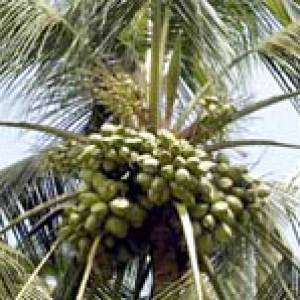
Chandra Sankara (COD x WCT)
Chandra Sankara (COD x WCT) is recommended for cultivation in Kerala and Karnataka regions.
This hybrid variety is known for its heavy yield, producing an average of 116 nuts per palm, with a range of 100 to 150 nuts.
The copra content in each nut ranges from 160 to 230 grams, making it suitable for copra production.
· Irrigation is necessary during the summer months to ensure optimal growth and yield of Chandrasankara (COD*WCT) palms.
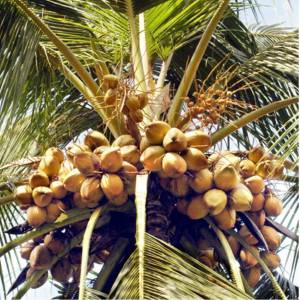
Kera Sankara (WCT X COD)
This variety is ideally suited for cultivation in Kerala, coastal Andhra Pradesh, and coastal Maharashtra.
Expect the tree to start bearing by the fourth year of planting.
Annual yield of 108 nuts per palm, with a range spanning from 70 to 130 nuts
Tall Cultivars
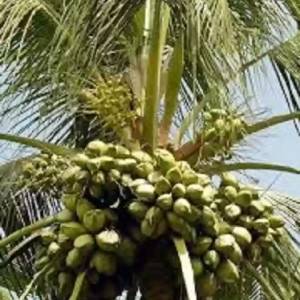
Kalpa Dhenu
Ideally suited for cultivation in Kerala, the East Coast region of Tamil Nadu, Andhra Pradesh, and the Andaman & Nicobar Islands.
Typically commences flowering within 6 to 7 months after planting.
The potential to yield 22,794 nuts per hectare per year in Tamil Nadu state.
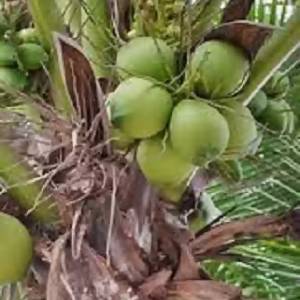
Kalpa Tharu
Kalpa Tharu is ideal for ball copra production due to its specific characteristics.
It yields around 116 nuts per palm per year with copra content of 176g, under rainfed situations.
It is Recommended for cultivation in the states of Karnataka, Kerala and Tamil Nadu.
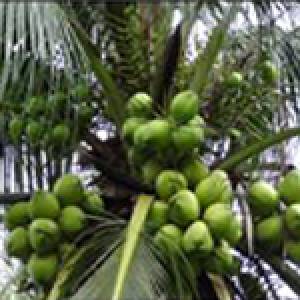
Kalpa Haritha
A superior high yielding tall selection with lesser incidence of eriophyid mite infestation.
The average nut yield of Kalpa Haritha is 118 nuts per palm per year under rainfed conditions with estimated copra yield of 25.5 kg per palm per year.
It Recommended for Kerala and Karnataka suitable for copra and tender nut purpose
Dwarf Cultivar
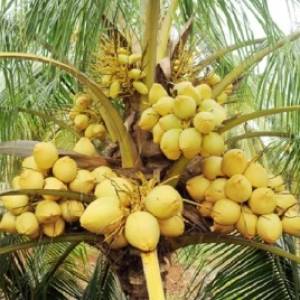
Kalpa Jyothi
This dwarf variety bears yellow fruits.
It boasts a higher average yield of 114 nuts per palm per year under rainfed conditions, with an estimated copra yield of over 16 kg per palm per year.
Ideal for cultivation in Kerala and Karnataka, suited for tender nut purposes.
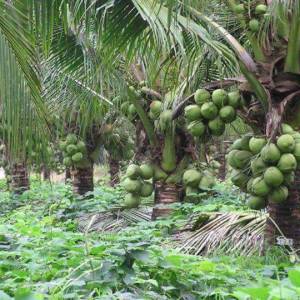
Kalpa Sree
This cultivar is renowned for its superior quality of coconut oil, characterized by very sweet tender nut water and meat, and is highly resistant to root (wilt) disease.
It is Known as the earliest flowering cultivar, it typically begins flowering within 2.5 to 3 years after planting.
The annual yield of 90 nuts per palm, with a copra content of 96.3g.
- This variety exhibits resistance to root (wilt) disease, making it particularly well-suited for cultivation in the prevalent areas of Kerala.
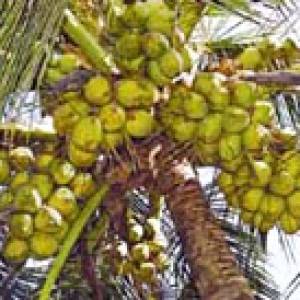
Kalpa Raksha
Kalpa Raksha is a semi-tall variety known for its sweet tender nut water and enhanced resistance to root (wilt) disease, making it suitable for prevalent areas of Kerala.
It commences flowering around 54 months after planting.
The annual yield per palm is approximately 87 nuts, with copra production averaging 16.38 kg and oil yield at 10.65 kg.
· In areas affected by root (wilt) disease, the annual yield may decrease to around 65 nuts per palm.
· The tender nut water quantity of Kalpa Raksha is approximately 290ml.

